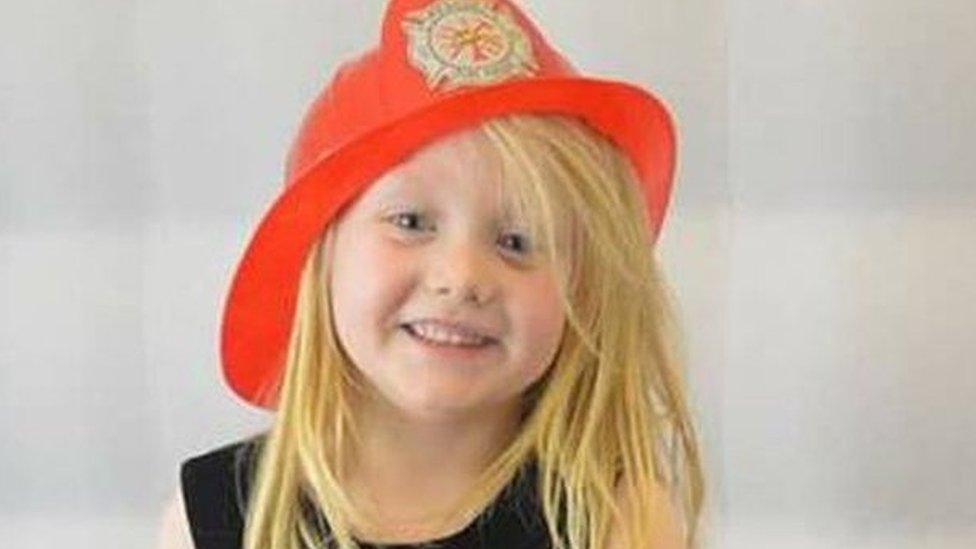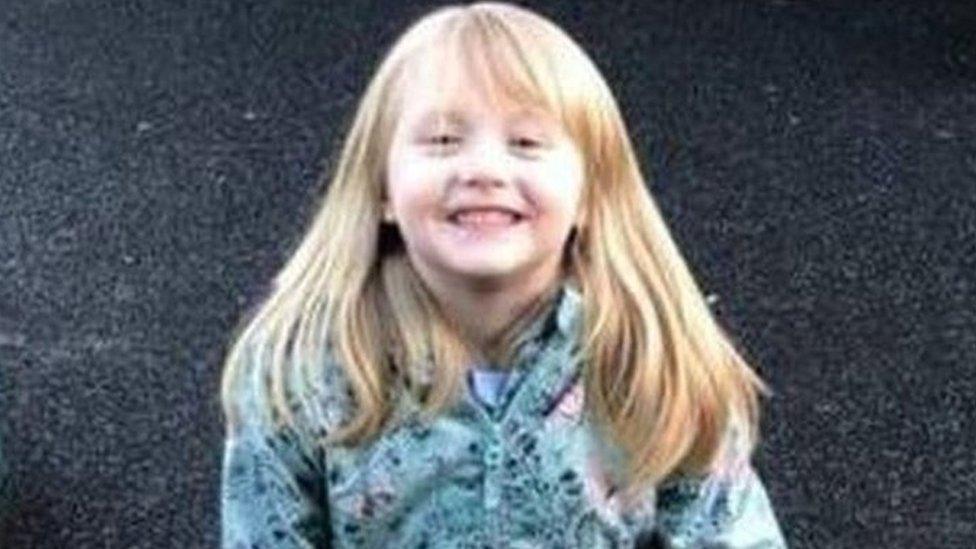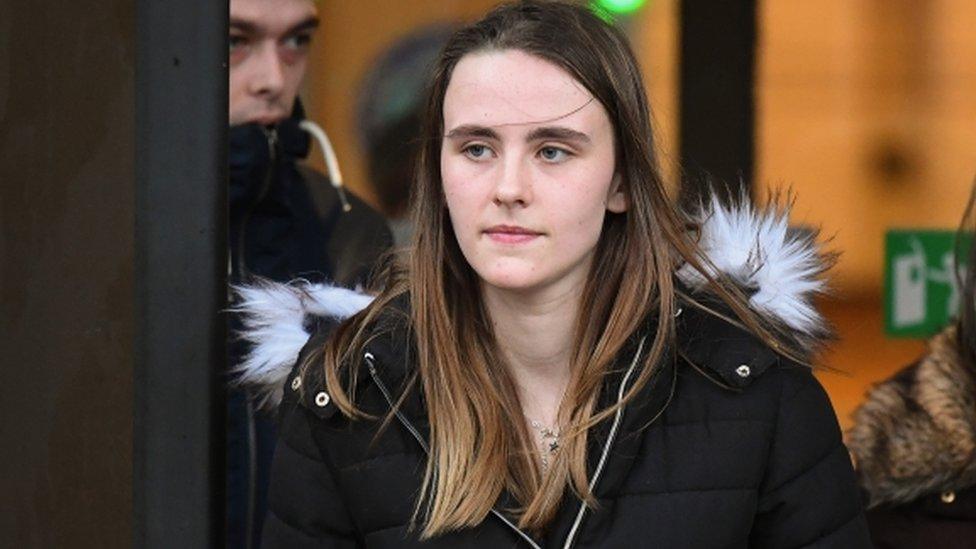Alesha MacPhail murder trial: Six-year-old's injuries 'catastrophic'
- Published

Alesha's body was found in the grounds of a former hotel on 2 July last year
A pathologist has told the Alesha MacPhail murder trial that the six-year-old died after suffering "catastrophic" injuries.
Dr John Williams said the cause of death was significant pressure being applied to her face and neck.
He also told the court Alesha had 117 injuries, although some could have been caused by vegetation.
A 16-year old boy denies abducting, raping and murdering the schoolgirl on the Isle of Bute.
The accused cannot be named because he is under the age of 18.
It is alleged that Alesha was taken from the home her grandparents shared with her father.
Warning: The following contains details of Alesha's injuries
Dr Williams was one of the pathologists who carried out the post-mortem examination on her body after she was found in woodland at a disused hotel on 2 July last year.
He told the High Court in Glasgow the injuries to Alesha's neck and face were consistent with being gripped, and those to her nose and mouth were consistent with smothering.
He added it was also possible her windpipe was pushed shut.
Dr Williams also said Alesha had "catastrophic" genital injuries, more severe than he had ever seen before.
And he said Alesha's feet appeared to be uninjured which he agreed would be consistent with her being carried to the area.
Jurors later heard how the accused's mother called police after learning her son had left the family home in the early hours of 2 July.
She had watched CCTV footage from cameras installed at their home.

The 54-year-old told the court her son had been at home drinking with friends and she had argued with him over damage caused to furniture. She thought he had then gone to bed.
The following day she helped search for Alesha and later checked her CCTV system which covered the front and back of her home.
She had installed the CCTV as a precaution when her mother, who suffered from dementia, had lived with her.
The court heard the boy had "gone out, come back, gone out and come back again" in the early hours of 2 July.
CCTV evidence
Jurors were shown footage in which she identified her son leaving their home at 01:54 on 2 July, wearing all black, and returning at 03:35 no longer wearing his black top.
At 03:44, a light is turned on in the bathroom and he is seen leaving a minute later wearing only shorts and carrying an item.
The mother said she told her son about the footage and asked him why he was out, to which he said: "I don't know, I might have been looking for my phone."
She asked him if he knew anything about the missing girl.
"He was lying sleeping," she said. "I asked 'have you seen this little girl - do you or your friends know anything?'
"He said 'no' then just rolled back over.
"We were trying to explain to him that whoever done this would have left DNA. He was not sure what DNA was.
"He was adamant he had nothing to do with it. There was no way they would find his DNA because he had been nowhere near this little girl."
His mother later phoned police to "eliminate" her son from inquiries, saying: "Obviously I really didn't think he had anything to do with it whatsoever."
She described her son as being "clever at maths", "well-liked" and said he had "lots of friends".
'Similar' knife
The court heard the boy later claimed to his mother he had gone out in the early hours to "buy weed".
Further CCTV footage showed the boy out at about 04:00 shining a torch before running off from his home.
His mother was also shown a knife found on the shore of Bute during the murder inquiry.
She accepted it was "very similar" to knives found in a set at her home.
Meanwhile witness Alexander McLachlan contacted police after watching CCTV footage from outside his Bute home in the early hours of 2 July.
He told the court it showed "someone walking as if carrying something" on the shoreline.
Mr McLachlan said: "I presumed that it was someone carrying a child."
The accused has also been charged with attempting to hide evidence.
He has claimed it was Toni McLachlan, the partner of Alesha's father, who killed her.
During her evidence to the court on Wednesday, Ms McLachlan insisted she had nothing to do with Alesha's death, telling jurors: "I loved her to pieces."
The trial, before Lord Matthews, continues.

Why is the BBC not naming the accused?
It is illegal in Scotland to publish the name, address, school or any other information which could identify anyone under the age of 18 who is the accused, victim or witness in a criminal case
This law applies to social media as well as to websites, newspapers and TV and radio programmes.
However, the name of victims who have died can be published - so the BBC and other outlets are able to identify Alesha MacPhail.
How can an accused blame someone else for the crime?
Ahead of their trial, the accused can lodge a special defence such as self-defence (they were defending themselves from attack), alibi (they were somewhere else when the crime was committed) and mental disorder (the accused is not responsible for their actions because they were suffering from a psychiatric condition).
In this case, the accused has lodged a special defence of incrimination, which means he has claimed that someone else (Toni McLachlan) was responsible.
However, the Crown must still prove the guilt of the accused beyond reasonable doubt. There is no onus on the accused to prove their special defence is true, and he or she can still be acquitted even if the jury does not believe their special defence.
- Published13 February 2019

- Published12 February 2019

- Published11 February 2019
